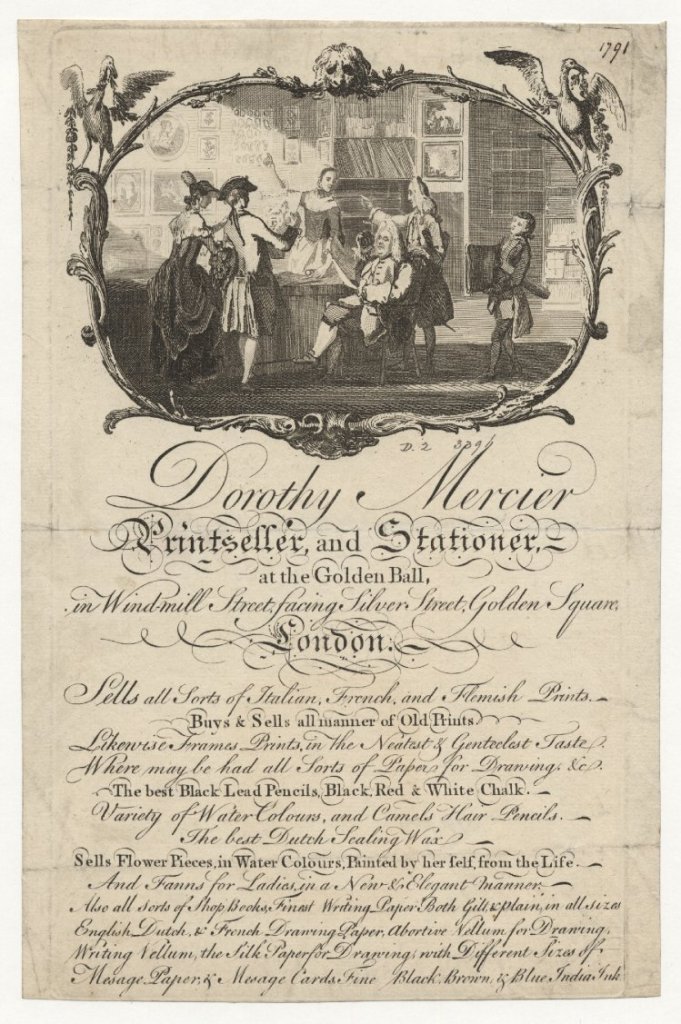Last week, my post mentioned that women professionals were rare in the 19th century. Well, my research since has proven that to be untrue. There were plenty of professional females, be they producers, merchants or investors. Even at the beginning of the 18th century, single women handled 10% of the business conducted in London. (18th Century Women Who Brought Home the Bacon)

A Woman’s Options
Why are we under the misnomer that women had few options for earning a living? All I can think is that women’s history is far less known than our male counterparts and has been largely ignored until recently. An editorial in The Times in 1857 states a long upheld, if false, belief about women’s options being limited to “Marry-Stitch-Die-or Do Worse.”
However, women did that and much better. Plenty of women were successful entrepreneurs. Female capital supported stock companies behind municipal utilities and railways, as well as setting up, or inheriting, and running their own enterprises.
“A little enterprise could secure for its proprietor many things: an income
Alison Kay, The Foundations Of Female Entrepreneurship: Enterprise,
that could be woven around domestic commitments; independence and a measure of
respectability; the preservation of her home and household; and a retirement
strategy.”
Home and Household in London c. 1800- 1870 p133
Earning a Living
So, what could 19th century women do to earn a living of their own? It depended on their financial background, skills, and, of course, their marital status.
A lack of education limited lower-class women, and they had to rely on their practical skills. They were usually required to find employment to help contribute to their household, so their earnings were not their own. If women were lucky enough to come from a family of manufacturers, they could learn the skills they would need to set up in business on their own or take over from their family if need be. Women who inherited property or money could set up and run their own enterprises or invest their wealth.
Real Female Entrepreneurs
Trade cards and insurance policies of the day provide a vast array of evidence about some professions and enterprises women were involved in. The most common were running lodging houses or inns, running establishments that provided food and drink, education, dressmaking, and midwifery.
Trade cards have been found for less conventional professions, too, such as one for Sarah Greenland, who was a tobacco and pipe maker. A Mary Wiggett was a chimney sweep, and a Dorothy Mercier was a print-seller and stationer.

Professional Women
As usual, sexism came into play regarding how professional woman were viewed by society. While males were rewarded with praise and raised social status, female entrepreneurs were often ridiculed and shamed. A woman having a job was regarded as a sign of financial desperation rather than a desire for success.
Propriety and the domestic demands of their households also limited women in their business choices. Like many working women today, they had to balance both.
Single women and widows had greater rights and freedoms than married women, and they were at least entitled to keep their earnings. Anything a married woman earned became her husband’s and most men would not yield financial control over their wives. It’s understandable why most female entrepreneurs in the 19th century were single women or widows, but they still may have had difficulty accessing their money. Male relatives would often feel the need to interfere, specially if a woman’s assets were held in trust.
I hope you enjoyed this. In my next post, I will answer my question about women and bank accounts.
If you want to add to this post, please leave a comment below.
Want more content like this?
Sign up for my mailing list and get a bit of history in your inbox!
Sources
Review Of : The Foundations Of Female Entrepreneurship
18th Century Women Who Brought Home the Bacon
Discover more from Bianca White Writes
Subscribe to get the latest posts sent to your email.
One thought on “Female Entrepreneurs in the 18th and 19th Century”